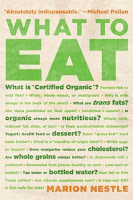
Driving home from Baltimore to Chicago, I had many hours to kill, or catch up on reading, depending on how you look at it. I dove in to my borrowed copy of What to Eat, written by professor of nutrition at NYU. As a food and nutrition professional, Marion Nestle helps us decifer food culture. She does her best to peel away the layers of politics and marketing mayhem to walk the average consumer through the aisles of the grocery store understanding the nutritional difference between butter and margarine, the biochemistry of high-fructose corn syrup, and the secrets of selling processed foods by adding health claims to the boxes.
Key concepts to walk away with:
- Organic ¹ healthy - candy is candy whether the sugar is organic or not. Eat organic meat and dairy to avoid extra hormones and antibiotics. Choose organic produce for conventional fruits and vegetables that require high loads of pesticides.
- Most cereal sends our body into a hyper insulin mania. Added vitamins and minerals do not compensate for the sugar rush, which will inherently cause weight gain. When glucose is not stored as glycogen (because the muscles and liver are already concentrated), the excess sugar is stored as fat. Choose cereals high in fiber, made with whole grains such as oats, bran, buckwheat, barley and amaranth, avoid sugar words in the ingredients especially if it is listed high in the list (a.k.a. honey, high fructose corn syrup, beet sugar, cane sugar, brown sugar, corn syrup solids, sucrose, fructose, dextrose).
- We get 9% of our calories from bread, so choose wisely. The least amount of ingredients the better - bread does not need to be a science experiment. Go with a multi-grain high in fiber and with no added sugars or hydrogenated oils. Brands I recommend include Baker's, Vermont, French Meadow (especially their spelt or whole rye and yeast free varieties), Pepperidge Farm (some varieties), and Whole Foods and Trader Joe's whole grain varieties.
- Margarine is made by making a liquid fat more solid by adding hydrogens to the fatty acid chain. This changes the shape of the fat from cis to trans, which basically means bending the fat and causing it to be more plastic. Think of a fat that can bend around the curves of your arteries; not too bad. Then we add hydrogens to that fat so that it will not go rancid, but in doing so, the fat can no longer slip around those curves. Instead we have clogged arteries, inflammation, and poor immunity when eating baked goods, crackers, and peanut butter made with partially hydrogenated oils. Read the ingredients; the FDA does not require food manufacturers to include trans fats in the food label if there is less than 0.5 grams per serving. Be weary of the serving size!
- Limit soy products, especially highly processed soy. Research is not conclusive regarding the safety of soy. The studies showing the benefits - lowering cholesterol - are backed by manufacturers and other entities that benefit from soy sales. Other research demonstrates that the isoflavones in soy mimic estrogen (phytoestrogens) and may increase risks of prostate, breast, and uterine cancer in genetically sensitive individuals. Note: this may be a problem for men and women alike. If you do like soy, stick to tofu, edamame, miso, tempeh, or soy milk with limited processing. Avoid soy protein concentrates and soy protein isolates. To make these food ingredients, found in cereal, protein bars, powders, and veggie burgers, the soybean must be heated to such extreme temperatures that any benefits are destroyed. In general, high temps create problems; the same is true when heating fats or oils to high temperatures, such as in frying.
Trying to be a more conscientious grocery shopper? This book is for you. And because it is written by a noteworthy nutrition professional who did extensive research, it is a trusted source. You will also find that it is written with conversational tone with some science added in, but not too much that you need a chemistry degree to decipher (although I do have a chem degree so please post if this is not a true statement).

Great write up. I never knew that about processed soy. It's frustrating when you falsely think you are are making a "healthy" choice because of marketing. I love tempeh though, especially this tempeh ratatouille recipe:http://find.myrecipes.com/recipes/recipefinder.dyn?action=displayRecipe&recipe_id=1197213
ReplyDelete